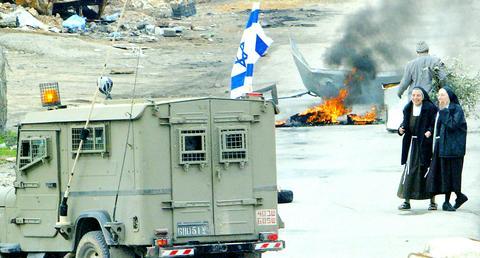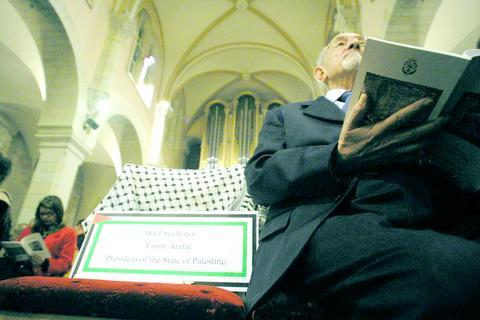After three years of Israeli-Palestinian fighting, politics dominated a subdued Christmas Eve celebration in the traditional birthplace of Jesus.
Banners declaring "No land, No future, No Christmas trees" hung alongside a meager display of lights and streamers on Wednesday. Many worshippers, including the top Roman Catholic official in the Holy Land, complained about a contentious separation barrier that Israel is building in the West Bank.

PHOTO: REUTERS
And for a third straight year, foreign tourists who used to flock to Bethlehem for Christmas were largely absent.

PHOTO: AFP
Like most Palestinian towns and cities, Bethlehem has been battered by the violence. The fighting has left behind destroyed, pockmarked buildings and a battle-scarred population.
Economically shattered by the violence, the cash-strapped Palestinian Authority cut its Christmas budget this year, making decorations sparse in Manger Square, home to the fortress-like Church of the Nativity. The church is built over the grotto where Jesus is believed to have been born.
Just as it has been since fighting erupted, Bethlehem remained nearly barren of tourists and pilgrims as modern-day problems overshadowed the celebrations. Israel's separation barrier was the unofficial theme of the day.
The Latin Patriarch of Jerusalem, Michel Sabbah, rang a political note in his Midnight Mass homily, saying "the separation wall will give no security and no peace."
"The sacrifices of these years will not be for nothing if those responsible conclude the true results, rather than concluding that building the wall is the true solution," Sabbah said. "The true results are that war destroys people and places and does not silence a people that demands its freedom."
Sabbah -- the highest-ranking Catholic official in the Holy Land -- said Israel's occupation of the West Bank and Gaza Strip is the "basic evil" in the conflict.
"If the leaders indeed want peace they must have the sufficient courage to undertake the difficult decisions for the sake of peace, even if that martyrs them," Sabbah said.
Sabbah officiated over Mass in St. Katherine's Church next to the Church of the Nativity.
St. Katherine's was filled with church officials, Bethlehem council members, diplomats and worshippers for midnight Mass.
For the third straight year, a front-row seat was left empty for Yasser Arafat, who was kept away by Israel. The seat was draped with a black and white checkered kaffiyeh, like the trademark headdress Arafat wears. A sign on the seat read: "Yasser Arafat, president of the State of Palestine."
The veteran Palestinian leader had attended Christmas Eve celebrations every year after Israel turned the town over to Palestinian control in December 1995.
In Manger Square in front of the church, a few thousand people gathered to watch Sabbah's procession to the ancient church. Most of the people were local Palestinians.
Only a few hundred foreign tourists were in the crowd, a far cry from the tens of thousands that had thronged the square each year before the fighting.
Z. Helmer, a 59-year-old dentist from Fort Worth, Texas, who came with his wife to Bethlehem for a second consecutive Christmas, showed rare optimism.
"There are more people here this year. Last year it was raining. This year it's very nice. It's great," he said.
Decorations were much more subdued than in past years. Trees in the square were lit with small rings of lights, but otherwise bare. A life-size Santa doll overlooked the square, attached to a lamppost as if it were hanging from a gallows.
"Don't convert Bethlehem into a ghetto" and "The wall strangles the birthplace of Jesus" read banners prominently placed over Manger Square.
The barrier, meant to keep Palestinian attackers out of Israel, dips deep into the West Bank. Palestinians strongly oppose the structure, saying it is an illegal seizure of land they claim for a state.
The barrier -- a series of concrete walls, trenches, razor wire and fences -- cuts off parts of Bethlehem from the town itself and from nearby Jerusalem.
Bethlehem residents said the hardships brought about by the violence and Israeli military measures, left little room for Christmas cheer.
But since the violence erupted in late 2000, Israel has prevented Arafat from making the 20km trip from his battered West Bank headquarters.
Christmas Eve used to be the peak of business for many Bethlehem shopkeepers. On Wednesday, half the shops in an arcade lining one side of the square were closed.
"We don't have pilgrims, no tourists, nobody," said Bethlehem resident Elias Abu Akleh, 52, standing in the middle of the sparsely populated square. "For whom are they going to open?"
A group of Palestinians carried signs against the barrier the length of Manger Square. Christmas "gives us an opportunity to tell the world, `we are suffering, please help us to stop this wall,'" said Hazem Azza, 24, a university student.
Relatives of 26 Palestinian gunmen who were expelled after holing up in the church during a monthlong standoff with Israeli forces in May last year also used Christmas to share their grief. A child with a Santa Claus cap held a picture of her father and a Palestinian flag.
But the political emphasis dismayed Mahran Tawwil, 19, a student from nearby Beit Sahour.
"We came here to celebrate Christmas, not to deal with other problems," he said.

Kehinde Sanni spends his days smoothing out dents and repainting scratched bumpers in a modest autobody shop in Lagos. He has never left Nigeria, yet he speaks glowingly of Burkina Faso military leader Ibrahim Traore. “Nigeria needs someone like Ibrahim Traore of Burkina Faso. He is doing well for his country,” Sanni said. His admiration is shaped by a steady stream of viral videos, memes and social media posts — many misleading or outright false — portraying Traore as a fearless reformer who defied Western powers and reclaimed his country’s dignity. The Burkinabe strongman swept into power following a coup in September 2022

‘FRAGMENTING’: British politics have for a long time been dominated by the Labor Party and the Tories, but polls suggest that Reform now poses a significant challenge Hard-right upstarts Reform UK snatched a parliamentary seat from British Prime Minister Keir Starmer’s Labor Party yesterday in local elections that dealt a blow to the UK’s two establishment parties. Reform, led by anti-immigrant firebrand Nigel Farage, won the by-election in Runcorn and Helsby in northwest England by just six votes, as it picked up gains in other localities, including one mayoralty. The group’s strong showing continues momentum it built up at last year’s general election and appears to confirm a trend that the UK is entering an era of multi-party politics. “For the movement, for the party it’s a very, very big

ENTERTAINMENT: Rio officials have a history of organizing massive concerts on Copacabana Beach, with Madonna’s show drawing about 1.6 million fans last year Lady Gaga on Saturday night gave a free concert in front of 2 million fans who poured onto Copacabana Beach in Rio de Janeiro for the biggest show of her career. “Tonight, we’re making history... Thank you for making history with me,” Lady Gaga told a screaming crowd. The Mother Monster, as she is known, started the show at about 10:10pm local time with her 2011 song Bloody Mary. Cries of joy rose from the tightly packed fans who sang and danced shoulder-to-shoulder on the vast stretch of sand. Concert organizers said 2.1 million people attended the show. Lady Gaga

SUPPORT: The Australian prime minister promised to back Kyiv against Russia’s invasion, saying: ‘That’s my government’s position. It was yesterday. It still is’ Left-leaning Australian Prime Minister Anthony Albanese yesterday basked in his landslide election win, promising a “disciplined, orderly” government to confront cost-of-living pain and tariff turmoil. People clapped as the 62-year-old and his fiancee, Jodie Haydon, who visited his old inner Sydney haunt, Cafe Italia, surrounded by a crowd of jostling photographers and journalists. Albanese’s Labor Party is on course to win at least 83 seats in the 150-member parliament, partial results showed. Opposition leader Peter Dutton’s conservative Liberal-National coalition had just 38 seats, and other parties 12. Another 17 seats were still in doubt. “We will be a disciplined, orderly